- Home
- Thomas Hardy
The Distracted Preacher
The Distracted Preacher Read online
Copyright
THE DISTRACTED PREACHER by Thomas Hardy
First appeared in HARPER’S WEEKLY, NEW YORK,
AND NEW QUARTERLY MAGAZINE, LONDON, 1879
© 2012 Melville House Publishing
First Melville House printing: June 2012
Melville House Publishing
145 Plymouth Street
Brooklyn, NY 11201
www.mhpbooks.com
ISBN: 978-1-61219-112-6
Library of Congress Cataloging-in-Publication Data:
A catalog record is available from the Library of Congress
Contents
Title Page
Copyright
I. How His Cold Was Cured
II. How He Saw Two Other Men
III. The Mysterious Great-Coat
IV. At the Time of the New Moon
V. How They Went to Lullstead Cove and Back
VI. The Great Search at Nether-Moynton
VII. The Walk to Warm’ell Cross; and Afterwards
Illuminations
CHAPTER I
HOW HIS COLD WAS CURED
Something delayed the arrival of the Wesleyan minister, and a young man came temporarily in his stead. It was on the thirteenth of January, 183-, that Mr. Stockdale, the young man in question, made his humble entry into the village, unknown, and almost unseen. But when those of the inhabitants who styled themselves of his connection became acquainted with him, they were rather pleased with the substitute than otherwise, though he had scarcely as yet acquired ballast of character sufficient to steady the consciences of the hundred and forty Methodists of pure blood who, at this time, lived in Nether-Moynton, and to give in addition supplementary support to the mixed race which went to church in the morning and chapel in the evening, or when there was a tea—as many as a hundred and ten people more, all told, and including the parish-clerk in the winter-time, when it was too dark for the vicar to observe who passed up the street at seven o’clock—which, to be just to him, he was never anxious to do.
It was owing to this overlapping of creeds that the celebrated population-puzzle arose among the denser gentry of the district around Nether-Moynton; how could it be that a parish containing fifteen score of strong full-grown Episcopalians, and nearly thirteen score of well-matured Dissenters, numbered barely two-and-twenty score adults in all?
The young man being personally interesting, those with whom he came in contact were content to waive for a while the graver question of his sufficiency. It is said that at this time of his life his eyes were affectionate, though without a ray of levity; that his hair was curly, and his figure tall; that he was, in short, a very lovable youth, who won upon his female hearers as soon as they saw and heard him, and caused them to say, “Why didn’t we know of this before he came, that we might have gied him a warmer welcome!”
The fact was that, knowing him to be only provisionally selected, and expecting nothing remarkable in his person or doctrine, they and the rest of his flock in Nether-Moynton had felt almost as indifferent about his advent as if they had been the soundest church-going parishioners in the country, and he their true and appointed parson. Thus when Stockdale set foot in the place nobody had secured a lodging for him, and though his journey had given him a bad cold in the head, he was forced to attend to that business himself. On inquiry he found that the only possible accommodation in the village would be found at the house of one Mrs. Lizzy Newberry, at the upper end of the street.
It was a youth who gave this information, and Stockdale asked him who Mrs. Newberry might be.
The boy said that she was a widow-woman, who had got no husband, because he was dead. Mr. Newberry, he added, had been a well-to-do man enough, as the saying was, and a farmer; but he had gone off in a decline. As regarded Mrs. Newberry’s serious side, Stockdale gathered that she was one of the trimmers who went to church and chapel both.
“I’ll go there,” said Stockdale, feeling that, in the absence of purely sectarian lodgings, he could do no better.
“She’s a little particular, and won’t hae gover’ment folks, or curates, or the pa’son’s friends, or such like,” said the lad, dubiously.
“Ah, that may be a promising sign. I’ll call. Or no; just you go up and ask first if she can find room for me. I have to see one or two persons on another matter. You will find me down at the carrier’s.”
In a quarter of an hour the lad came back, and said that Mrs. Newberry would have no objection to accommodate him, whereupon Stockdale called at the house. It stood within a garden hedge, and seemed to be roomy and comfortable. He saw an elderly woman, with whom he made arrangements to come the same night, since there was no inn in the place, and he wished to house himself as soon as possible; the village being a local centre from which he was to radiate at once to the different small chapels in the neighborhood. He forthwith sent his luggage to Mrs. Newberry’s from the carrier’s, where he had taken shelter, and in the evening walked up to his temporary home.
As he now lived there, Stockdale felt it unnecessary to knock at the door; and entering quietly, he had the pleasure of hearing footsteps scudding away like mice into the back quarters. He advanced to the parlor, as the front room was called, though its stone floor was scarcely disguised by the carpet, which overlaid only the trodden areas, leaving sandy deserts under the furniture. But the room looked snug and cheerful. The firelight shone out brightly, trembling on the bulging mouldings of the table-legs, playing with brass knobs and handles, and lurking in great strength on the under surface of the chimney-piece. A deep arm-chair, covered with horse-hair, and studded with a countless throng of brass nails, was pulled up on one side of the fireplace. The tea-things were on the table, the teapot cover was open, and a little hand-bell had been laid at that precise point towards which a person seated in the great chair might be expected instinctively to stretch his hand.
Stockdale sat down, not objecting to his experience of the room thus far, and began his residence by tinkling the bell. A little girl crept in at the summons, and made tea for him. Her name, she said, was Marther Sarer, and she lived out there, nodding towards the road and village generally. Before Stockdale had got far with his meal a tap sounded on the door behind him, and on his telling the inquirer to come in, a rustle of garments caused him to turn his head. He saw before him a fine and extremely well-made young woman, with dark hair, a wide, sensible, beautiful forehead, eyes that warmed him before he knew it, and a mouth that was in itself a picture to all appreciative souls.
“Can I get you anything else for tea?” she said, coming forward a step or two, an expression of liveliness on her features, and her hand waving the door by its edge.
“Nothing, thank you,” said Stockdale, thinking less of what he replied than of what might be her relation to the household.
“You are quite sure?” said the young woman, apparently aware that he had not considered his answer.
He conscientiously examined the tea-things, and found them all there. “Quite sure, Miss Newberry,” he said.
“It is Mrs. Newberry,” said she. “Lizzy Newberry. I used to be Lizzy Simpkins.”
“Oh, I beg your pardon, Mrs. Newberry.” And before he had occasion to say more she left the room.
Stockdale remained in some doubt till Martha Sarah came to clear the table. “Whose house is this, my little woman,” said he.
“Mrs. Lizzy Newberry’s, sir.”
“Then Mrs. Newberry is not the old lady I saw this afternoon?”
“No. That’s Mrs. Newberry’s mother. It was Mrs. Newberry who comed in to you just by now, because she wanted to see if you was good-looking.”
Later in the evening, when Stockdale was about to begin supper, she came a
gain. “I have come myself, Mr. Stockdale,” she said. The minister stood up in acknowledgment of the honor. “I am afraid little Marther might not make you understand. What will you have for supper? There’s cold rabbit, and there’s a ham uncut.”
Stockdale said he could get on nicely with those viands, and supper was laid. He had no more than cut a slice when tap-tap came to the door again. The minister had already learned that this particular rhythm in taps denoted the fingers of his enkindling landlady, and the doomed young fellow buried his first mouthful under a look of receptive blandness.
“We have a chicken in the house, Mr. Stockdale; I quite forgot to mention it just now. Perhaps you would like Marther Sarer to bring it up?”
Stockdale had advanced far enough in the art of being a young man to say that he did not want the chicken, unless she brought it up herself; but when it was uttered he blushed at the daring gallantry of the speech, perhaps a shade too strong for a serious man and a minister. In three minutes the chicken appeared, but, to his great surprise, only in the hands of Martha Sarah. Stockdale was disappointed, which perhaps it was intended that he should be.
He had finished supper, and was not in the least anticipating Mrs. Newberry again that night, when she tapped and entered as before. Stockdale’s gratified look told that she had lost nothing by not appearing when expected. It happened that the cold in the head from which the young man suffered had increased with the approach of night, and before she had spoken he was seized with a violent fit of sneezing, which he could not anyhow repress.
Mrs. Newberry looked full of pity. “Your cold is very bad to-night, Mr. Stockdale.”
Stockdale replied that it was rather troublesome.
“And I’ve a good mind—” she added, archly, looking at the cheerless glass of water on the table, which the abstemious young minister was going to drink.
“Yes, Mrs. Newberry?”
“I’ve a good mind that you should have something more likely to cure it than that cold stuff.”
“Well,” said Stockdale, looking down at the glass, “as there is no inn here, and nothing better to be got in the village, of course it will do.”
To this she replied, “There is something better, not far off, though not in the house. I really think you must try it, or you may be ill. Yes, Mr. Stockdale, you shall.” She held up her finger, seeing that he was about to speak. “Don’t ask what it is; wait, and you shall see.”
Lizzy went away, and Stockdale waited in a pleasant mood. Presently she returned with her bonnet and cloak on, saying, “I am so sorry, but you must help me to get it. Mother has gone to bed. Will you wrap yourself up, and come this way, and please bring that cup with you?”
Stockdale, a lonely young fellow, who had for weeks felt a great craving for somebody on whom to throw away superfluous interest, and even tenderness, was not sorry to join her, and followed his guide through the back door, across the garden to the bottom, where the boundary was a wall. This wall was low, and beyond it Stockdale discerned in the night-shades several gray headstones, and the outlines of the church roof or tower.
“It is easy to get up this way,” she said, stepping upon a bank which abutted on the wall; then putting her foot on the top of the stone-work, and descending by a spring inside, where the ground was much higher, as is the manner of grave-yards to be. Stockdale did the same, and followed her in the dusk across the irregular ground till they came to the tower door, which, when they had entered, she softly closed behind them.
“You can keep a secret?” she said, in a musical voice.
“Like an iron chest!” said he, fervently.
Then from under her cloak she produced a small lighted lantern, which the minister had not noticed that she carried at all. The light showed them to be close to the singing-gallery stairs, under which lay a heap of lumber of all sorts, but consisting mostly of decayed framework, pews, panels, and pieces of flooring, that from time to time had been removed from their original fixings in the body of the edifice and replaced by new.
“Perhaps you will drag some of those boards aside?” she said, holding the lantern over her head to light him better. “Or will you take the lantern while I move them?”
“I can manage it,” said the young man; and acting as she ordered, he uncovered, to his surprise, a row of little barrels bound with wood hoops, each barrel being about as large as the nave of a common wagon-wheel. When they were laid open Lizzy fixed her eyes on him, as if she wondered what he would say.
“You know what they are?” she asked, finding that he did not speak.
“Yes, barrels,” said Stockdale simply. He was an inland man, the son of highly respectable parents, and brought up with a single eye to the ministry, and the sight suggested nothing beyond the fact that such articles were there.
“You are quite right; they are barrels,” she said, in an emphatic tone of candor that was not without a touch of irony.
Stockdale looked at her with an eye of sudden misgiving. “Not smugglers’ liquor?” he said.
“Yes,” said she. “They are tubs of spirit that have accidentally come over in the dark from France.”
In Nether-Moynton and its vicinity at this date people always smiled at the sort of sin called in the outside world illicit trading,; and these little tubskegs of gin and brandy were as well known to the inhabitants as turnips. So that Stockdale’s innocent ignorance, and his look of alarm when he guessed the sinister mystery, seemed to strike Lizzy first as ludicrous, and then as very awkward for the good impression that she wished to produce upon him.
“Smuggling is carried on here by some of the people,” she said, in a gentle, apologetic voice. “It has been their practice for generations, and they think it no harm. Now, will you roll out one of the tubs?”
“What to do with it?” said the minister.
“To draw a little from it to cure your cold,” she answered. “It is so burning strong that it drives away that sort of thing in a jiffy. Oh, it is all right about our taking it. I may have what I like; the owner of the tubs says so. I ought to have had some in the house, and then I shouldn’t ha’ been put to this trouble; but I drink none myself, and so I often forget to keep it in-doors.”
“You are allowed to help yourself, I suppose, that you may not inform where their hiding-place is?”
“Well, no, not that particularly, but I may take some if I want it. So help yourself.”
“I will, to oblige you, since you have a right to it,” murmured the minister; and though he was not quite satisfied with his part in the performance, he rolled one of the tubs out from the corner into the middle of the tower floor. “How do you wish me to get it out—with a gimlet, I suppose?”
“No; I’ll show you,” said his interesting companion. And she held up with her other hand a shoemaker’s awl and a hammer. “You must never do these things with a gimlet, because the wood-dust gets in; and when the buyers pour out the brandy, that would tell them that the tub had been broached. An awl makes no dust, and the hole nearly closes up again. Now tap one of the hoops forward.”
Stockdale took the hammer and did so.
“Now make the hole in the part that was covered by the hoop.”
He made the hole as directed. “It won’t run out,” he said.
“Oh yes it will,” said she. “Take the tub between your knees and squeeze the heads, and I’ll hold the cup.”
Stockdale obeyed; and the pressure taking effect upon the tub, which seemed to be thin, the spirits spurted out in a stream. When the cup was full he ceased pressing, and the flow immediately stopped. “Now we must fill up the keg with water,” said Lizzy, “or it will cluck like forty hens when it is handled, and show that ’tis not full.”
“But they tell you you may take it?”
“Yes, the smugglers; but the buyers must not know that the smugglers have been kind to me at their expense.”
“I see,” said Stockdale, doubtfully. “I much question the honesty of this proceeding.”
By her direction he held the tub with the hole upward, and while he went through the process of alternately pressing and ceasing to press she produced a bottle of water, from which she took mouthfuls, then putting her pretty lips to the hole, where it was sucked in at each recovery of the cask from pressure. When it was again full he plugged the hole, knocked the hoop down to its place, and buried the tub in the lumber as before.
“Aren’t the smugglers afraid that you will tell?” he asked as they recrossed the church-yard.
“Oh no; they are not afraid of that. I couldn’t do such a thing.”
“They have put you into a very awkward corner,” said Stockdale, emphatically. “You must, of course, as an honest person, sometimes feel that it is your duty to inform—really, you must.”
“Well, I have never particularly felt it as a duty; and, besides, my first husband—” She stopped, and there was some confusion in her voice. Stockdale was so honest and unsophisticated that he did not at once discern why she paused; but at last he did perceive that the words were a slip, and that no woman would have uttered “first husband” by accident unless she had thought pretty frequently of a second. He felt for her confusion, and allowed her time to recover and proceed. “My husband,” she said, in a self-corrected tone, “used to know of their doings, and so did my father, and kept the secret. I cannot inform, in fact, against anybody.”
“I see the hardness of it,” he continued, like a man who looked far into the moral of things. “And it is very cruel that you should be tossed and tantalized between your memories and your conscience. I do hope, Mrs. Newberry, that you will soon see your way out of this unpleasant position.”
“Well, I don’t just now,” she murmured.
By this time they had passed over the wall and entered the house, where she brought him a glass and hot water, and left him to his own reflections. He looked after her vanishing form, asking himself whether he, as a respectable man, and a minister, and a shining light, even though as yet only of the halfpenny-candle sort, were quite justified in doing this thing. A sneeze settled the question; and he found that when the fiery liquor was lowered by the addition of twice or thrice the quantity of water, it was one of the prettiest cures for a cold in the head that he had ever known, particularly at this chilly time of the year.

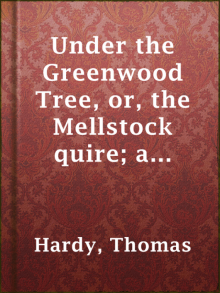 Under the Greenwood Tree; Or, The Mellstock Quire
Under the Greenwood Tree; Or, The Mellstock Quire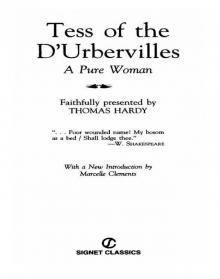 Tess of the D'Urbervilles
Tess of the D'Urbervilles Desperate Remedies
Desperate Remedies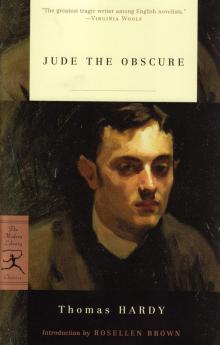 Jude the Obscure
Jude the Obscure Two on a Tower
Two on a Tower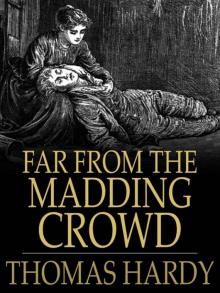 Far from the Madding Crowd
Far from the Madding Crowd The Return of the Native
The Return of the Native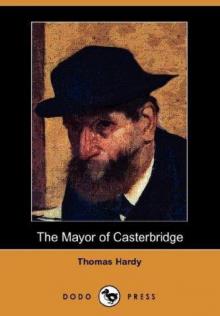 The Mayor of Casterbridge
The Mayor of Casterbridge The Well-Beloved
The Well-Beloved A Laodicean : A Story of To-day
A Laodicean : A Story of To-day The Woodlanders
The Woodlanders Under the Greenwood Tree
Under the Greenwood Tree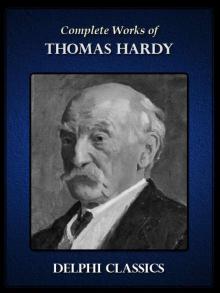 Complete Works of Thomas Hardy (Illustrated)
Complete Works of Thomas Hardy (Illustrated)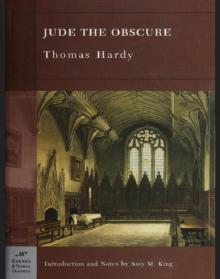 Jude the Obscure (Barnes & Noble Classics Series)
Jude the Obscure (Barnes & Noble Classics Series) The Distracted Preacher
The Distracted Preacher